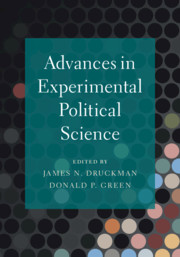Book contents
- Frontmatter
- Contents
- List of Figures
- List of Tables
- List of Boxes
- List of Contributors
- Acknowledgements
- 1 A New Era of Experimental Political Science
- Part I Experimental Designs
- Part II Experimental Data
- Part III Experimental Treatments and Measures
- Part IV Experimental Analys is and Presentation
- Part V Experimental Reliability and Generalizability
- Part VI Using Experiments to study Identity
- Part VII Using Experiments to Study Government Actions
- 27 Experiments on and with Street-Level Bureaucrats
- 28 The State of Experimental Research on Corruption Control
- 29 Experiments on Political Activity GovernmentsWant to Keep Hidden
- 30 Experiments in Post-Conflict Contexts
- 31 Experiments on Problems of Climate Change
- 32 A Constant Obsession with Explanation
- Author Index
- Subject Index
29 - Experiments on Political Activity GovernmentsWant to Keep Hidden
from Part VII - Using Experiments to Study Government Actions
Published online by Cambridge University Press: 08 March 2021
- Frontmatter
- Contents
- List of Figures
- List of Tables
- List of Boxes
- List of Contributors
- Acknowledgements
- 1 A New Era of Experimental Political Science
- Part I Experimental Designs
- Part II Experimental Data
- Part III Experimental Treatments and Measures
- Part IV Experimental Analys is and Presentation
- Part V Experimental Reliability and Generalizability
- Part VI Using Experiments to study Identity
- Part VII Using Experiments to Study Government Actions
- 27 Experiments on and with Street-Level Bureaucrats
- 28 The State of Experimental Research on Corruption Control
- 29 Experiments on Political Activity GovernmentsWant to Keep Hidden
- 30 Experiments in Post-Conflict Contexts
- 31 Experiments on Problems of Climate Change
- 32 A Constant Obsession with Explanation
- Author Index
- Subject Index
Summary
All governments engage in covert political activity, but it is often in the public’s interest to expose these actions and subject them to informed discourse. Experiments provide a way for social scientists to make more general and reliable inferences about hidden political activity, which may in turn shed light on key political processes with implications for theory and for public welfare. This chapter describes experiments that have exposed the hidden actions of government, including censorship, propaganda, surveillance, and repression, to ground a discussion of two particular challenges related to the design and execution of these experiments: validity and ethics. Experiments to expose hidden political activity usually entail creating proxies for the ultimate object of study rather than manipulation of the object itself. As a result, experimentalists need to take special care in assessing the validity of the intervention and of observed outcomes. Experiments to expose hidden political actions also often have broader impacts beyond research participants, and require consideration of ethics beyond human subjects. Using experiments to uncover covert political activity is applicable in non-democratic and democratic contexts, as well as to in the study of other powerful organizations whose activities have political ramifications.
- Type
- Chapter
- Information
- Advances in Experimental Political Science , pp. 544 - 561Publisher: Cambridge University PressPrint publication year: 2021
- 2
- Cited by



